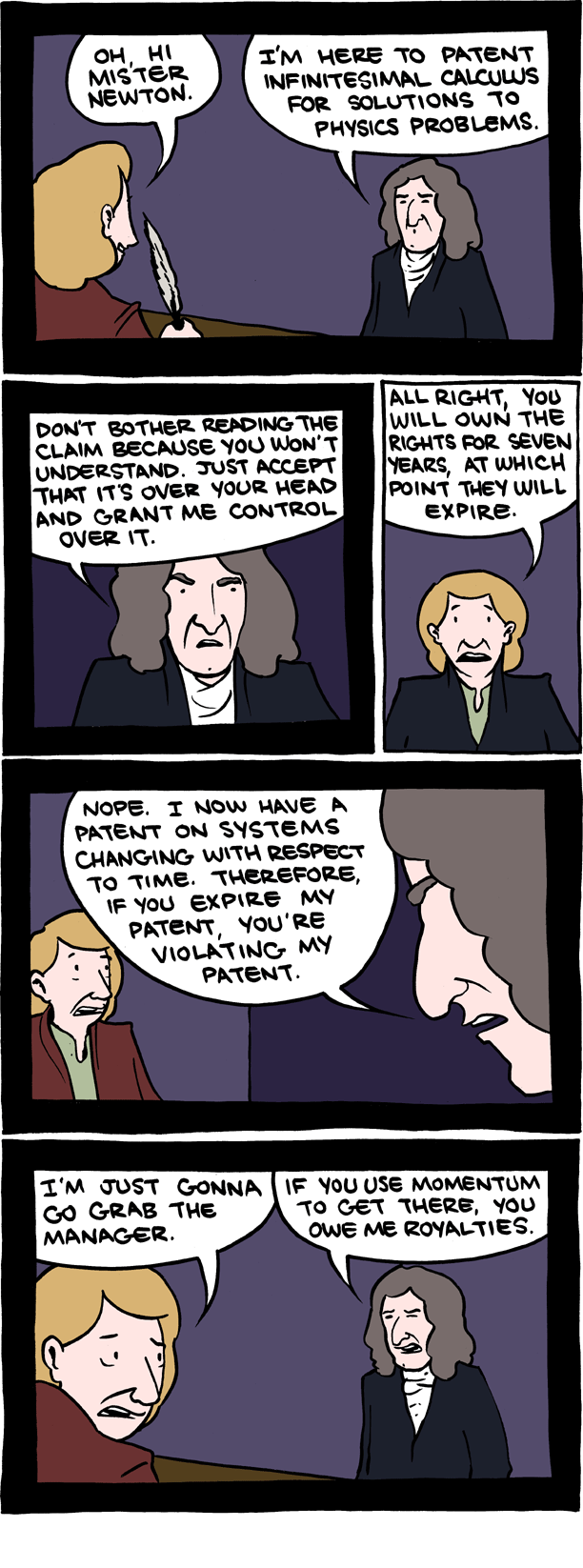[EDITED IN:
I like AKuz's analogy to land squatting. In most of our dominant societies today, it is generally agreed that you can't just move into a patch of land, it has to belong to
someone if only to the government. There are various sorts of anarchists who believe that the government shouldn't be allowed to own land and that such land is free for private owners to claim... but there's almost no one, not even communists, who really think land should be
completely unowned. Someone has to be in charge of deciding what happens to it, whether or not they extract any profit from their decision.
And we routinely accept consequences of this- the idea that land belongs to some specific person- Consequences like:
1) Paying parking fees (how dare you put your hunk of metal here without permission!?)
2) Squatters getting evicted even if that means they experience serious physical suffering.
3) People getting evicted out of long-established homes for failing to pay
back rent or property taxes.
And we have entire categories of institution that exist
only because we have this widespread concept of land ownership but sometimes we have to compromise on that in order to solve a practical problem. Such as water rights agreements in dry regions. Such as eminent domain. Such as, again, property taxes. Such as requirements to mark property boundaries, such as professional surveyors who sort out land disputes. Such as (in past ages) feudalism.
You can argue that the concept of land ownership is necessary to the function of civilization- and it is. Or rather, it's necessary to the function of
our civilization. It's not impossible to imagine a society that just doesn't care or informally negotiates such disputes in a way that doesn't really translate as 'ownership.' Modern humans in developed societies generally don't actually do that, but that doesn't mean that alternate-universe humans couldn't, or that less territorial creatures from another world couldn't.
Well, here we're seeing the converse applied to IP rights. A civilization where there are a huge number of institutions that have grown up around the concept of dealing in, and brokering, IP rights and ensuring that they are properly distributed and that society doesn't just totally seize up and cease to function due to the implications of that.
END OF EDIT]
It's kinda crazy to imagine how industry would work. Like, okay, you invent a warp drive, but you're probably going to use some off-the-shelf components in it, so that means you're paying patents for energy conduits, cooling pumps, specific storage tank designs...
And then, to power it, you probably need to license a fusion reactor from someone, which itself probably has easily 1000 sub-licences for various improved magnets, electronic timers, shielding, etc... maybe even the equations that govern it's functioning.
I suspect that a lot of this is standardized and 'bundled' in a manner similar to the way the financial sector of 21st century Earth bundles debts and so on.
There are probably clans who are MASSIVELY successful because they have the IP on how to 'bundle' large amounts of individual IPs into a complicated but marketable system. Brokerage, in other words.
The other alternative to Creative Commons is that everyone breaks the rules all the time and is technically a criminal, but clans settle things by "arbitration" in which they tally up everything periodically and pay each other off. Unless you're one of the underclass in which case you have no juice and can't do anything without being thrown in prison. In which case first contact with the Enterprise might have been less honest confusion and more jumping at the opportunity to extend their protection racket. Maybe it wasn't peacefully resolved because they got a look at the age of the sensors but rather they got a look at the size of the phasers.
The notion that some virtuous Dylaarian scientist would never dream of reverse-engineering a PADD might be less a truth and more a cultural myth, with what actually happens totally dependent on what the scientist thinks she can get away with.
You never know; alien minds are alien. It may be that rule-breaking is relatively common but the people involved feel
deeply guilty and actually are legitimately offended when they find evidence of it. Sort of like marital infidelity- it's not that it doesn't happen, it's not even especially
rare, but hardly anyone ever approves and it is almost unanimously discouraged.
In other words, it's not that the Dylaarians are the MPAA. It's that the MPAA is a bunch of humans insincerely pretending to be Dylaarians. They're unlikeable because they're trying to enforce an alien mentality on a species that doesn't "naturally" believe in it.
Well, Prince at the time.
Leslie: "Meh. It's been a while. Promotions happen."
I still had a chance to go ahead and detail the Renaissance mesh. I'd like to get the broad shape right before I apply a subsurf to smooth it all out. It becomes much harder to make large changes afterwards, but it's difficult to model any small additions (such as windows!) before I do that. So, any comments/criticisms on the current model?
I'm very happy with this hullform, though I was at least minimally satisfied with the old one. It definitely looks like a good starting point for "first of the 24th century designs," arguably more so than the canon
Ambassador with its
Excelsior-esque nacelle pylons and circular deflector.



